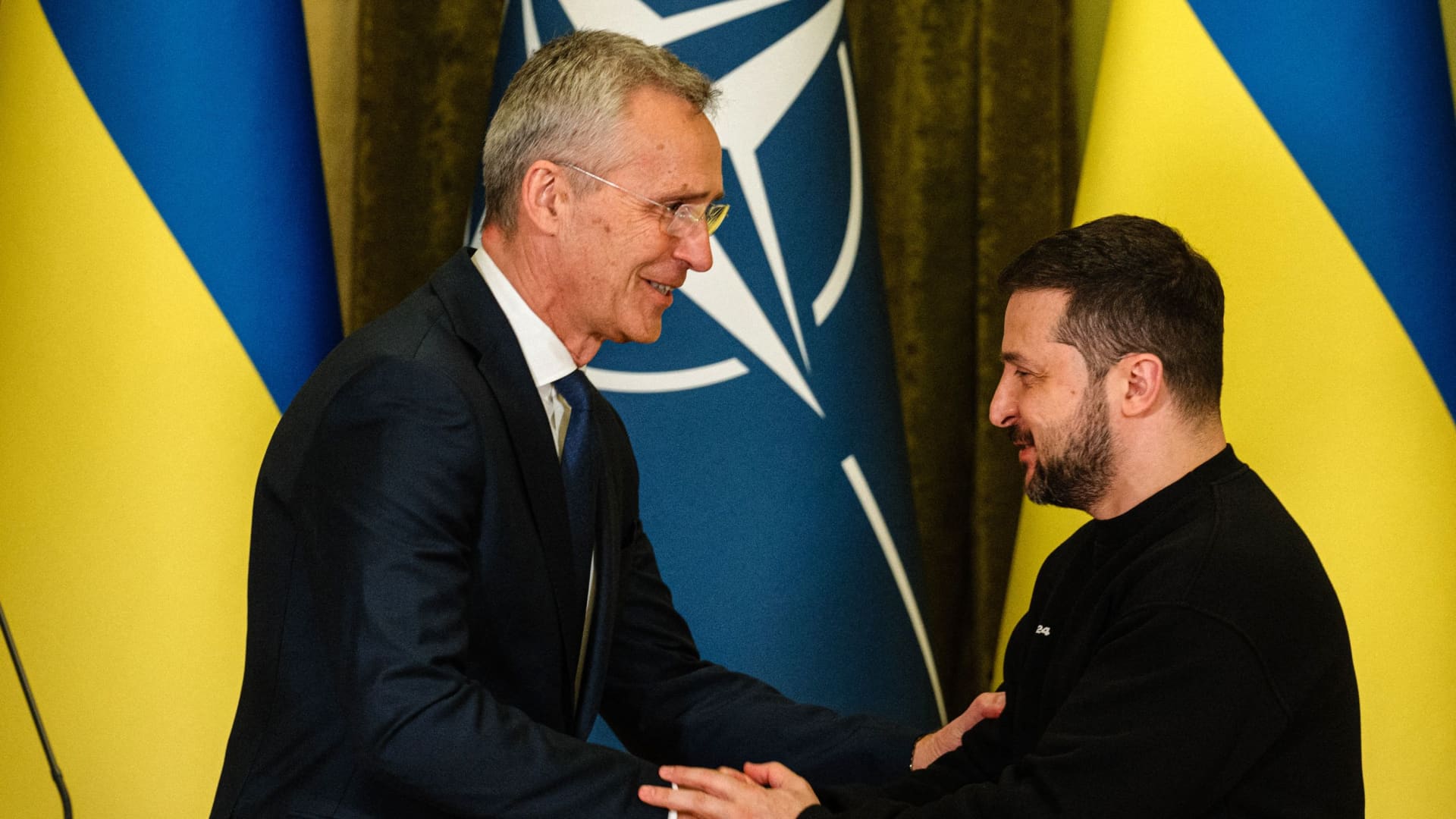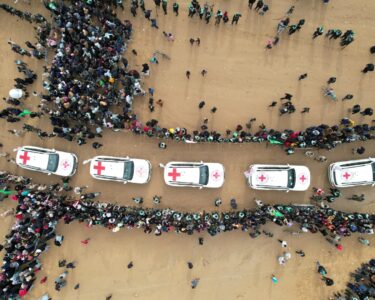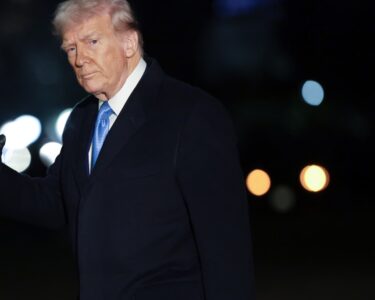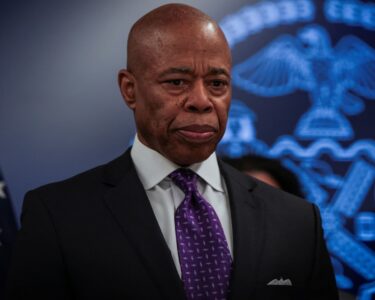This was CNBC’s live blog tracking developments on the war in Ukraine on April 20, 2023. See here for the latest updates.
Ukraine’s President Volodymyr Zelenskyy said Thursday that it was time for NATO to invite Ukraine to join the Western military alliance, repeating a much-heard plea from Kyiv for fast-track membership.
Speaking at a joint news conference in Kyiv with NATO Secretary-General Jens Stoltenberg, who made an unannounced visit to Kyiv Thursday, Zelenskyy said he had been invited to the next NATO summit in July, but that Kyiv wanted more — that is, full NATO membership.
In other news, Zelenskyy said Wednesday evening that Kyiv is doing everything it can to bolster Ukraine’s defenses against Russian strikes as expectations mount over the timing of Ukraine’s much-awaited counteroffensive.
Ukraine’s Deputy Defense Minister Hanna Maliar said yesterday that Ukrainian forces are already conducting some counteroffensive actions and that there would be no single, preemptive announcement that a counteroffensive is to begin.
Factors believed to have delayed the launch include the weather — as Ukraine is emerging from its seasonal muddy period — and the wait for more Western weapons supplies and equipment. Ukraine’s defense minister reiterated the country’s call for more defense systems and for NATO-style fighter jets.
Russian audit documents show Deutsche Bank’s Russian subsidiary saw profits jump by almost six-fold in 2022 to 5.4 billion rubles ($66.42 million), according to Reuters.
It’s the latest example of a foreign lender booking strong earnings in the Russian market.
As Russian lenders collapsed under sweeping Western sanctions, foreign banks have stepped in to pick up the business.
Read the full earnings report on Reuters.
— Joy-Marie Scott
The State Department said it was deeply concerned with Russia’s interference with the Black Sea Grain Initiative.
“Twice in the last two weeks, the Russian Federation’s delegation at the Joint Coordination Center in Istanbul has prevented the continued inspection of ships seeking to sail into Ukraine ports to collect grain,” Deputy State Department spokesman Vedant Patel said during a daily press briefing.
Under the Black Sea Grain Initiative, a U.N.-backed deal in July that established a humanitarian sea corridor for Ukrainian agricultural products, nearly 30 million metric tons of food has entered the global market.
“Russia must stop using the world’s food as a weapon in its war on Ukraine and allow the Black Sea Grain Initiative to operate at its maximum potential. Ukrainian grain should reach the world unimpeded,” Patel added.
— Amanda Macias
U.S. Ambassador to the United Nations Linda Thomas-Greenfield met with Volker Turk, the U.N. High Commissioner for Human Rights in New York.
The two expressed joint concerns regarding urgent human rights situations around the world, including Ukraine, the recent violence in Sudan and the treatment of Uyghurs and other marginalized groups in Xinjiang and throughout China.
U.S. Mission to the United Nations spokesman Nate Evans said the two also discussed the upcoming commemoration of the 75th anniversary of the Universal Declaration of Human Rights.
— Amanda Macias
U.S. President Joe Biden spoke with President Ursula von der Leyen of the European Commission on additional ways allies can support Ukraine.
Biden and von der Leyen reiterated their commitment to ensuring Ukraine has the economic and security assistance it needs while also continuing to impose costs on the Kremlin.
“The leaders also discussed ongoing joint efforts to accelerate the transition to clean energy economies” in an effort to mitigate any dependence on Russian fuel, according to a readout provided by the White House.
The two also discussed regional security issues related to China and Taiwan.
— Amanda Macias
NATO Secretary General Jens Stoltenberg laid a wreath at a memorial in Bucha in honor of those who died during Russia’s occupation of the Ukrainian city.
The aftermath of the occupation in the suburban town near Kyiv was described by Ukrainian President Volodymyr Zelenskyy as a “genocide” last April.
Ukraine’s government says more than 1,400 people, including 37 children, were killed in Bucha during Russia’s occupation. Ukraine’s Prosecutor General Andriy Kostin has previously said that at least 9,000 Russian war crime cases have been reported in Bucha alone.
The Kremlin has previously denied accusations that its troops in Ukraine have executed or tortured civilians.
— Amanda Macias
Estonia approved an initiative to send additional rounds of ammunition to Ukraine in the latest security assistance package.
“Tomorrow in Ramstein I will also meet the Minister of Defence of Ukraine Oleksii Reznikov to discuss how and with what Estonia can further help Ukraine,” Defense Minister Hanno Pevkur said in a statement shared by the Estonian government.
The latest arms package is made up of mostly 155mm rounds of ammunition but also includes night vision equipment and light weaponry ammunition to Ukraine.
The Estonian government says it has provided Ukraine with military aid worth approximately 400 million euros, which is more than 1% of the Estonian gross domestic product.
— Amanda Macias
Ukraine’s Defense Minister Oleksii Reznikov said his country’s top priority is to establish a coordinated and layered air defense system to intercept incoming Russian missiles.
Reznikov said that in order to do so, Ukraine would need more U.S.-made Patriot missile defense systems, IRIS-T, NASAMS, and MiG-29 fighter jets.
“Given the Kremlin’s barbaric tactics, we need NATO-style fighter jets. We’ve heard ‘no, it’s impossible’ a lot. But I have seen firsthand how the impossible can become possible,” Reznikov said on Twitter.
“We will never forget how, thanks to the compassion and assistance of our friends, we were able to keep the lights and heat on in our homes last winter,” he added.
— Amanda Macias
The use of explosive weapons with wide area effects in populated areas has been one of the main causes of civilian casualties in Ukraine, the United Nations wrote in a report.
The United Nations Office of the High Commissioner for Human Rights estimates that approximately 90% of civilian casualties have been caused by explosive weapons.
“Such attacks have damaged or destroyed thousands of residential buildings, over 3,000 educational institutions and more than 600 medical facilities,” the group wrote.
“The systematic targeting of energy-related installations has, during certain periods, deprived large portions of the civilian population of electricity, water and sanitation, heating and telecommunications, and has hampered access to health and education,” the group added.
— Amanda Macias
Ukrainian photographer Evgeniy Maloletka won the World Press Photo of the Year award on Thursday for his tragic, chilling image of emergency workers carrying a pregnant woman through the rubble of a maternity hospital in Mariupol, the Associated Press reports.
Maloletka’s photo for the Associated Press portrays 32-year-old Iryna Kalinina, an expectant mother who was wounded in the abdomen after Russian forces bombed the Ukrainian city on March 9, 2022. She died of her injuries a half-hour after giving birth to the lifeless body of her baby, named Miron.
“For me, it is a moment that all the time I want to forget, but I cannot. The story will always stay with me,” Maloletka told the Associated Press in an interview.
Read the full story.
Joy-Marie Scott
U.S. Secretary of Defense Lloyd Austin is en route to Germany to host the Ukraine Defense Contact Group.
Earlier in the week, Austin met with counterparts in Sweden to discuss Ukrainian security assistance and Stockholm’s bid to join the NATO military alliance.
The Ukraine Defense Contact Group is a coalition of nearly 50 countries supporting Ukraine’s military needs. The upcoming meeting at Ramstein Air Base will be the eleventh time the group has met since it was formed last April.
— Amanda Macias
United States Agency for International Development administrator Samantha Power met with World Economic Forum President Borge Brende to discuss additional ways to support Ukraine.
“They discussed areas of potential collaboration related to expanding digital inclusion for gender equality, increasing private sector contributions toward climate adaptation, and better mobilizing private sector human and investment capital toward Ukraine’s economic recovery,” wrote United States Agency for International Development, or USAID, spokeswoman Jessica Jennings in a statement.
Since the start of the war last February, USAID has provided $9.88 billion in development and humanitarian assistance.
— Amanda Macias
Ukraine’s President Volodymyr Zelenskyy said Thursday that it was time for NATO to invite Ukraine to join the Western military alliance, repeating a much-heard plea from Kyiv for fast-track membership.
Speaking at a joint news conference in Kyiv with NATO Secretary-General Jens Stoltenberg, who made an unannounced visit to Kyiv Thursday, Zelenskyy said he had been invited to the next NATO summit in July, but that Kyiv wanted more.
“I am grateful for the invitation to visit the summit, but it is also important for Ukraine to receive the corresponding invitation,” he told reporters in comments reported by Reuters.
“There is not a single objective barrier to the political decision to invite Ukraine into the alliance and now, when most people in NATO countries and the majority of Ukrainians support NATO accession, is the time for the corresponding decisions.”
Stoltenberg said that Ukraine’s NATO membership bid — which it launched last September — and security guarantees would be high on the agenda at the alliance’s July summit, adding that Ukraine’s rightful place was in NATO.
Despite Stoltenberg’s words of support and encouragement, analysts believe Ukraine’s NATO membership bid faces significant hurdles and could take years to be approved, if it is at all.
Aside from the active war that’s ongoing in Ukraine, NATO members such as Hungary and Turkey would likely be very reluctant to further antagonize Russia by admitting Ukraine into the alliance. One of Moscow’s key bugbears ahead of the war was a potential further expansion of NATO eastwards to include Ukraine, despite that prospect being, even at that time, a distant possibility.
— Holly Ellyatt
Belarus’ President Alexander Lukashenko said Moscow and Minsk will stand together to resist what he claimed were “destructive forces” trying to “drag them” into a World War III scenario.
“We can see that Nazi, fascist and other destructive forces are making attempts to rewrite history, negate our joint contribution to the Great Victory [in World War II] and justify their criminal actions, both of that period and today,” Lukashenko told St. Petersburg Governor Alexander Beglov, who was visiting Minsk Thursday, according to comments published by Russian state news agency TASS that were translated by Google.
“They are trying to drag us into a third world war through the conflict in Ukraine. But I’m convinced [of one thing]: They failed to destroy our nations then, nor will they succeed in doing so now,” Lukashenko said.
He added that he knew of no other places in history “that have suffered as much from war” as Belarus and Leningrad — the former name of St. Petersburg in Russia.
Lukashenko did not elaborate on who Belarus sees as “Nazi, fascist and other destructive forces,” nor on what their “criminal actions” comprise, but his comments echo the language used by Russia to demonize Ukraine and its Western allies in NATO.
Moscow has repeatedly made false claims that the government in Kyiv government is led by “fascists” and “Nazis,” despite the fact that Ukraine’s President Volodymyr Zelenskyy is Jewish.
— Holly Ellyatt
Hungary has banned imports of honey and certain meat products in addition to grains from Ukraine until June 30, the prime minister’s chief of staff said on Thursday, increasing pressure on Brussels to broaden proposed European Union-wide measures.
The European Commission said on Wednesday it would take emergency “preventive measures” for wheat, maize, sunflower seeds and rapeseed after some central European countries took unilateral steps to ban imports of food products from Ukraine to protect their own agricultural sectors.
However, Hungary and Poland have said that other products should also be included.
The Hungarian ban on imports of major cereals and agricultural products “includes a total of 25 products, the most important of which are cereals, rapeseed and sunflower seeds, flour, oil, honey and certain meat products,” Gergely Gulyas said.
The government’s announcement came after Hungary’s Agriculture Minister Istvan Nagy demanded the expansion of any EU-wide import ban to include “eggs, honey and poultry”, in a Facebook post late on Wednesday.
Nagy also told state news agency MTI on Wednesday that Hungary will continue to allow transit of Ukrainian grain, ensuring the departure of such shipments “in a controlled manner”.
“It was worthwhile for Hungary to take firm action and protect the interests of Hungarian farmers,” he said, referring to the ban, adding the measures forced Brussels to take action.
An EU official said this would only allow the grains to enter the five countries from Ukraine if they were set for export to other EU members or to the rest of the world. This measure would last until the end of June.
Poland’s Agriculture Minister Robert Telus said on Wednesday that talks with Brussels would continue at the beginning of next week
The countries became transit routes for Ukrainian grain that could not be exported through Ukraine’s Black Sea ports because of Russia’s invasion.
Bottlenecks then trapped millions of tons of grains in countries bordering Ukraine, forcing local farmers to compete with an influx of cheap Ukrainian imports.
— Reuters
NATO Secretary-General Jens Stoltenberg visited Kyiv on Thursday, marking his first trip to the Ukrainian capital since the beginning of Russia’s invasion last year.
Stoltenberg paid his respects to Ukrainian soldiers who were killed in the war and reviewed damaged Russian military equipment displayed on a central square in Kyiv, Reuters reported.
Stoltenberg’s visit comes as representatives from Ukraine and its allies prepare to gather in Ramstein in Germany on Friday for the latest meeting of the Ukraine Defense Contact Group — or UDCG — to coordinate security assistance for Ukraine.
Ukraine is expected to plead for more surface-to-air missiles at the meeting, as its own stocks are believed to be running low.
Earlier this week, a U.S. senior defense official said that discussions are likely to revolve around providing continued support to Ukraine, both for now and its future defense, “while at the same time ensuring that nations involved in providing that support can backfill whatever they’ve sent to Ukraine so they can maintain their own defense.”
The Friday meeting will mark one year since U.S. Secretary of Defense Lloyd Austin first convened the UDCG at Ramstein.
— Holly Ellyatt
Denmark and the Netherlands announced plans to donate 14 Leopard 2 tanks as part of a European collective to supply main battle tanks to Ukraine.
In a joint statement, the countries’ defense ministers said the Leopard 2 tanks will be supplied to Ukraine from early 2024. The estimated cost of 165 million euros ($181 million) will be equally divided between the nations.
“In this way, we will jointly take part in the ‘Leopard 2 coalition’, supported by many partners and allies,” they said as they announced their intention to “jointly acquire, refurbish and donate” the Leopard 2 tanks.
“The ongoing Russian aggression against Ukraine must be met with resolve and further commitment of military support by allies and partners to bolster Ukraine,” they noted.
“We are determined to support Ukraine for as long as it takes. Ukraine must be able to defend itself against Russia’s invasion.”
— Holly Ellyatt
Ukrainian President Volodymyr Zelenskyy said Wednesday evening that Kyiv is doing everything it can to bolster Ukraine’s defenses against Russian strikes.
In his nightly address, Zelenskyy said “at the state level, everything is being done to increase the ability to defend against Russian strikes. Air defense systems and other weapons to protect the sky are already here in Ukraine, they are really powerful. But they should be – and, I am sure, will be – even more powerful,” he added.
There are many question marks over when and where Ukraine might begin its much-anticipated counteroffensive against Russia — and whether it has actually begun, as one Ukrainian official claimed yesterday.
Ukraine’s Deputy Defense Minister Hanna Maliar said Wednesday that Ukrainian forces are already conducting some counteroffensive actions, noting that in any case, Ukrainian forces would not preemptively announce the start of the counteroffensive aimed at liberating Russian-occupied areas in the country.
“It is incorrect to speak narrowly about a counteroffensive because it is a huge complex of various actions and measures that the armed forces of Ukraine are currently carrying out,” Maliar said at a briefing, news outlet Ukrinform reported.
“First of all, this is about preparing personnel for the complex of actions – both defensive and offensive. Altogether, this can be referred to as counter-offensive measures,” she added.
Western officials said in a defense briefing earlier this week that Ukraine will be well aware of mounting expectations over when and where its counteroffensive will be focused, but that the officials had few details as to the specifics.
— Holly Ellyatt
Russian Foreign Minister Sergei Lavrov is in Cuba for talks as his tour of allied countries in Latin America continues Thursday.
Lavrov will meet his Cuban counterpart Bruno Rodriguez Parrilla in Havana today as well as President Miguel Diaz-Canel.
Cuba is the final destination of Lavrov’s whirlwind tour of the region this week. He has visited Brazil, Venezuela and Nicaragua.
While in Venezuela, Lavrov said Russia would share its experience with the country on how to minimize the impact of Western sanctions, and also disparaged the United States, saying it was a country that can “cheat at any moment,” claiming Russia experienced this when the Western military alliance NATO expanded eastward.
Russia has repeatedly claimed it was tricked by Western nations at the end of the Cold War into believing that NATO would not expand eastward toward its territory.
But analysts say the Soviet Union was never offered any formal guarantee on limits to NATO expansion and that the “betrayal narrative” is designed to provoke anti-Western sentiment.
— Holly Ellyatt
Secretary of Defense Lloyd Austin and Chairman of the Joint Chiefs of Staff U.S. Army Gen. Mark Milley will travel to Germany to host the Ukraine Defense Contact Group.
The Ukraine Defense Contact Group is a coalition of nearly 50 countries supporting Ukraine’s military needs. Friday’s meeting at Ramstein Air Base will be the 11th time the group has met since it was formed last April.
— Amanda Macias
The Alaskan Region of North American Aerospace Defense Command detected, tracked, positively identified and intercepted two Russian aircraft entering and operating within the Alaska Air Defense Identification Zone, NORAD said in a release.
The Russian aircraft were TU-95 bombers and were escorted by NORAD aircraft on Monday, including F-16 fighter jets, F-22 fighter jets, KC-135 Stratotankers and E-3 AWACS.
“Russian aircraft remained in international airspace and did not enter American or Canadian sovereign airspace. This Russian activity in the North American ADIZ occurs regularly and is not seen as a threat, nor is the activity seen as provocative,” NORAD wrote in a release.
— Amanda Macias
Fans of FC Chernomorets Odesa raise flares as they line the road during the funeral procession for Sergiy Fedik, a football fan and Ukrainian serviceman killed near Bakhmut in the Donetsk region.
Bakhmut is the site of heavy recent fighting with the city a battlezone for more than eight months.
-Oleksandr Gimanov | AFP | Getty Images
The Kremlin rebuffed Western media reports alleging that Russia could be planning to sabotage wind farms and communications cables in the North Sea, saying they are baseless.
“These media of the mentioned countries [Denmark, Sweden, Norway, Finland] made a mistake in their investigation, they again baselessly prefer to blame Russia for everything,” Press Secretary Dmitry Peskov told reporters on Wednesday, state news agency TASS reported.
The comment come after a joint investigation by the public broadcasters of Denmark, Norway, Sweden and Finland which claims that Russia has a fleet of vessels in the North Sea disguised as fishing trawlers and research vessels that are actually intended for surveillance, mapping and possibly, sabotage.
The allegations are due to be aired in a TV series starting Wednesday evening and broadcast in Denmark, Norway, Sweden and Finland.
Peskov said Moscow would “prefer that they pay more attention to the topic of the terrorist attack on [the] Nord Stream” gas pipelines, saying “the need for a transparent, urgent and broad international investigation of these unprecedented terrorist acts, sabotage.”
Russia has repeatedly complained of being left out of separate investigations by Sweden, Germany and Denmark into the Nord Stream gas pipeline sabotage that damaged the Baltic Sea infrastructure last year.
— Holly Ellyatt
Russian Foreign Minister Sergei Lavrov said Wednesday that “the United States can cheat at any moment,” claiming Russia had experienced this when the Western military alliance NATO expanded eastward.
“I want to emphasize that everyone knows very well that the United States can cheat at any moment, and much more often they cheat than they keep their own promises, their own proposals,” Lavrov said as he addressed a press conference following talks with Venezuelan Foreign Minister Yvan Gil Pinto.
Lavrov claimed this deception was seen when former Soviet and Russian Federation Presidents Mikhail Gorbachev and Boris Yeltsin “were assured that NATO would not expand,” he added.
Russia has long complained that it was deceived by Western nations at the end of the Cold War and into the 1990s into believing that NATO would not expand eastward toward its territory.
Analysts say, however, that the USSR was never offered any formal guarantee on limits to NATO expansion and that the “betrayal narrative” is designed to provoke anti-Western sentiment.
Lavrov’s latest comments, reported by state news agency Tass and news outlet RIA Novosti, and translated by Google, come as he carries out a tour of Latin American countries this week, a trip seen as a way for Russia to cement its alliances with countries in the region.
Lavrov characterized Russia as the “world champion” in terms of the number of sanctions imposed by the West, and said Moscow would share its experience of avoiding their impact with Venezuela, a country that has been under Western sanctions for several years for a variety of reasons.
“I am convinced that our experience will also be useful to our Venezuelan friends, because we are now world champions in terms of the number of sanctions and we are accumulating experience quickly. So we will share it with our Venezuelan colleagues,” Lavrov said.
— Holly Ellyatt
U.S. ‘can cheat at any moment,’ Russia says; Kremlin rejects allegations over North Sea spying






